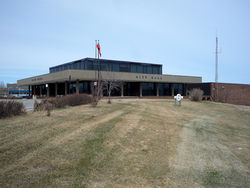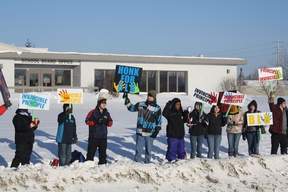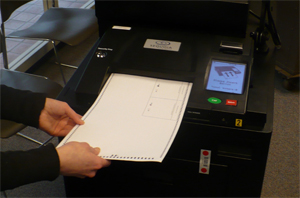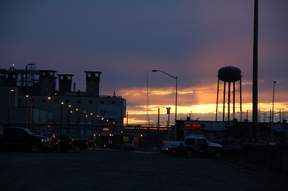

Elections are very often referendums on the incumbents seeking re-election. Voters are as likely to be voting against something or someone as for anything. But not always. The real story of the upcoming Oct. 22 municipal election in Thompson is not so much the newcomers seeking office, but the vast number of city councillors and School District of Mystery Lake (SDML) trustees who are not seeking office and will complete their terms at 11:59 a.m.Thursday, Oct. 23, including Mayor Tim Johnston, a two-term mayor and one-term councillor, first elected in 2002, and SDML chair Rob Pellizzaro, a local lawyer, who was first elected in 1998, and is the longest serving trustee on the board.
Thompson had a strong turnout for the last municpal election in 2010, with 41.1 per cent of the names on the eligible voters’ list showing up to vote. That figure equated to 3,638 Thompsonites – 3,536 with valid, accepted ballots, 26 voters who declined their ballots – led by 12 decliners at the Riverside poll – and 76 spoiled ballots. Many voters did not vote for an entire slate of eight council candidates, with the average ballot featuring only 5.8 votes for members of council.
In April 2009, council invoked Section 78 of the Municipal Act to add an eighth councillor as of the October general election, along with the mayor, for a nine-member council, reverting to the size council was until the early 1990s when they dropped a seat.
City councillors are elected at-large in Thompson.
Dating back to 1867 and the British North America Act, which sets out our basic post-Confederation governance structures, municipalities are creature of the provinces and the most junior level in our three-tier federal, provincial and municipal governance system. Without the consent of the Province of Manitoba, there is nothing the City of Thompson or any other Manitoba municipality can do.
It was the second-highest voter turnout in Thompson history – the record still belongs to the 1986 general election, where 42.4 per cent of registered voters showed up to re-elect then-mayor Don MacLean to a fourth term, but 2010 did finish just ahead of the 41 per cent turnout from 2006, which had been in second place.
Born and raised in Thompson, Johnston is the son of Dr. Blain Johnston, a former city councillor who was the first regular, full-time doctor in Thompson. He graduated from R.D. Parker Collegiate in 1980. After graduating from the University of Winnipeg with a degree in administrative studies and working in Winnipeg for several years, Johnston returned to Thompson in the late 1980s, when he purchased J.B. Johnston Ventures Ltd. from his parents. A past president of the Thompson Chamber of Commerce, in 1999 and 2000, Johnston is the manager of North Central Community Futures Development Corporation, and plans to remain there and continue to live in Thompson, he has said.
Also leaving city council is its longest serving-member, Coun. Stella Locker, a registered nurse as well as real estate broker, who chaired the city planning commission from 1967 to 1972 and chaired the industrial commission from 1982 to 1984. She was first elected to city council in 1989 and served as deputy mayor. In the last election in 2010, Locker finished on top at nearly every polling station, only finishing outside first place once – coming in third at Wapanohk in Eastwood.
Also stepping away is two-term Coun. Charlene Lafreniere, director of institutional advancement at the University College of the North (UCN) since September 2010, and previously executive director of the Thompson Neighbourhood Renewal Corporation (TNRC) and director of justice at Manitoba Keewatinowi Okimakanak (MKO). Lafreniere, who topped the polls in the 2006 council race, was re-elected, but with less support, in 2010.
Coun. Erin Hogan, first elected to city council in a city-wide byelection in December 2009 to replace Coun. Cory Young, was re-elected 10 months later in the October 2010 general municipal election. She is pregnant and expecting twins. During her almost five years as a councillor she served as a Manitoba board member on the Federation of Canadian Municipalities (FCM) national board of directors and was vice-chair of the standing committee on increasing women’s participation in municipal government. She works as a policy analyst in the aboriginal relations division of Manitoba Hydro.
The three incumbents seeking re-election as councillors are Penny Byer, first elected in 2010 also, Coun. Brad Evenson, a one-term councillor first elected four years ago, and owner of Patent Electric and former managing partner with the Wescan Electrical Company, who also served for four months in 2007 as president of the Thompson Chamber of Commerce, and Coun Judy Kolada, the second-longest serving member of council, first elected in 1994. She came to Manitoba from the south shore of Nova Scotia in the 1960s, following her graduation from Bridgewater Commercial College. She is a former executive director the YWCA of Thompson and before that retired from the provincial government, where she worked for the Department of Northern Affairs as a local government co-ordinator and the Department of Labour as a labour standards officer. Byer retired in April 2013 as Vale’s Manitoba Operations as corporate affairs co-ordinator, who moved to Thompson in 1978 to open up the CBC North Country studio and has a diploma in creative communications and certificates in marketing, public relations and journalism,
Two first-term incumbent councillors, Dennis Fenske and Luke Robinson, are seeking the mayor’s chair, meaning the loser will no longer sit on council.
Fenske, currently serving as deputy mayor, also controls DDAK Developments Inc., a family real estate development and holding company, and is a long time resident of Thompson. His parents, Len and Mary Fenske arrived in 1961 with six children planned to stay a couple of years until farming in Saskatchewan rebounded, he says on his Dennis Fenske for Mayor page on Facebook at https://www.facebook.com/pages/Dennis-Fenske-for-Mayor/1558721681016070
A centre, who shoots left, Fenske played three seasons of Junior B hockey in British Columbia for the Victoria Cougars from 1975 to 1978, and three more seasons between 1983 and 1986 for the University of Saskatchewan of the Canada West Universities Athletic Association (CWUAA). He returned to live in Thompson in 1988. Upon his return, he was hired by the City of Thompson as a recreation programmer for the Department of Recreation, Parks and Culture. In 1990, he was promoted to director, and served in that position until 1999. He then transferred to City Hall as the director of community development and human resources. He left the City of Thompson in the fall of 2007 for Vale where he is currently employed as engineering supervisor of support services for central engineering and the project management office.
Fenske is a widower. His wife, Don, died in May 2007 from amyotrophic lateral sclerosis (ALS), sometimes called Lou Gehrig’s disease after the New York Yankees’ slugger, first baseman and outfielder who died of ALS in June 1941. Both of their daughters are R.D. Parker Collegiate graduates: Allison is a lawyer and Kate a nurse. Fenske, who was out of town Sept. 19 during the ballot draw by senior election official Dave Turpie to determine position randomly on the ballot (which Fenske won over Robinson) was away to get married, Turpie said. Fenske had been engaged to Germaine Leger, of Thompson, formerly of Winnipeg, since Oct. 12, 2013. Both are half marathon long-distance runners who have competed for several years in June in the Manitoba Marathon in Winnipeg.
Luke Robinson, who was out of the gate early, announcing his mayoral run in May, won the eighth and final seat on council in the Oct. 27, 2010 election in a nail-biter of a race all night long, with challenger Jasper Robinson and Les Ellsworth staying in the mix right until the final poll. He first ran for a council a year earlier , finishing as runner-up to Hogan in the 2009 byelection. An automotive, truck and coach heavy-duty mechanic, Robinson is a Francophone, originally from Kapuskasing, in Northern Ontario. Bilingual, he was educated in French in elementary school and finished high school in English. He moved to Thompson in 1999 with his son, Randy, and has worked at Vale since 2001, where is a mechanical underground worker at Vale. He also as a daughter, Tammy, and two stepchildren, Angela and Ryan Bonner, with his partner of 12 years, Heather Bonner, who is Métis and a community liaison worker at Ma-Mow-We-Tak Friendship Centre. Robinson says his grandson, Drayden, will be multilingual, speaking, English, French and Cree.
Robinson also has a private pilot’s licence, owns an ultralight plane, has a cabin at Turnbull Lake in Leaf Rapids, and served 12 years as a volunteer firefighter, as well as serving as a school board trustee in Northern Ontario. Robinson’s City of Thompson biographical webpage http://www.thompson.ca/index.aspx?page=162 lists him as an “active union steward with USW Local 6166,” but the Thompson Labour Committee, when it met last week decided for the first time in years to endorse none of the candidates – incumbents or challengers – who had declared their intentions almost a week before nominations closed, and who are running for mayor, city council or School District of Mystery Lake trustee. Robinson brought greetings from the City of Thompson last Nov. 23 to the USW Local 6166 annual gala banquet and dance for their activists and stewards at the Juniper Centre.
Paul Andersen, long-time producer for Shaw TV in Thompson, Flin Flon and The Pas, is talking to Robinson at 9 a.m. today and took to Shaw TV’s Twitter account at https://twitter.com/ShawTVThompson last night to tweet, “If you have any questions to ask him, e-mail at shawcable11@yahoo.ca.”
Over at the School District of Mystery Lake meanwhile, the big news, aside from Pellizzaro not running again after 16 years on the board, is that Ryan Land and Caroline Winship are, as reported here Sept. 14. If you missed it earlier, you can read the story here at https://soundingsjohnbarker.wordpress.com/2014/09/14/ryan-land-and-caroline-winship-running-for-sdml-school-board-trustee-seats/
There are 11 candidates running for the seven SDML trustees seats.
Also stepping down after one term are 75-year-old trustee Sya Gregovski and Alexander Ashton, who had taught at University College of the North (UCN) and is the younger brother of two-term Churchill NDP MP Niki Ashton and the son of Thompson NDP MLA and minister of infrastructure and transportation Steve Ashton and Hari Dimitrakopoulou-Ashton, an economist and university lecturer in economics, management, and women’s studies, who is also a former SDML school board trustee. Alexander Ashton plans to live abroad this coming year.
Running again is veteran trustee Guido Oliveira, who works at Vale and was the top vote-getter in the Oct. 27, 2010 election; one-term trustee Vince Nowlin, who also works at Vale; Leslie Tucker, manager of Northern Region Training and Employment Services here for Jobs and the Economy Manitoba; and Janet Brady, who was elected in a byelection Nov. 17, 2011 to replace Valerie Wilson, who resigned and moved to Winnipeg, as a School District of Mystery Lake trustee. Brady easily swept by Julyda Lagimodiere in a 458 to 230 vote cakewalk.
Brady, 60, a Montreal native, is a product of Quebec’s Roman Catholic school system in the 1960s and early 1970s, and a senior instructor at the University of Manitoba’s Faculty of Social Work in the Northern Bachelor of Social Work program here.
A former social worker with Awasis from 1987 to 1990, Brady returned to Thompson in 2002 to teach at the University of Manitoba.
Brady has a master’s degree in social work from Carleton University in Ottawa.
In 1999, she sought the NDP nomination for the riding of Arthur-Virden for the September general election, but lost out to fellow dipper Perry Kalynuk.
She did secure the NDP nomination, however, in the riding of Turtle Mountain where she finished second, losing to Progressive Conservative incumbent Merv Tweed, now president of OmniTRAX Canada, the Bayline railway.
Other newcomers in the SDML trustee race include Don MacDonald, Liz Lychuk, Sandra Fitzpatrick, Doug Krokosz and Clint Saulteaux. Lychuk is the manager of child and adolescent mental health programs and mental health promotion here at the Northern Regional Health Authority (NRHA),.
Among the 18 city council hopefuls for eight council seats are two former mayoral candidates, Ron Matechuk, who lost to Johnston by only 208 votes, in 2010, and Colleen Smook, owner of McCreedy Campground, who lagged well behind in early balloting last time out and finished third in the mayor’s race with a total vote count of 681. Also running are Christa Herkert, after school program director at the Boys & Girls Club of Thompson, who is also a member of the Thompson Lion’s Club, Communities in Bloom and Operation Red Nose; Blake Ellis, who began his studies last week at the University of Manitoba’s Faculty of Social Work, where he is working towards a bachelor’s degree, but is undoubtedly better known for his previous employment roles as housing co-ordinator for the Thompson Neighbourhood Renewal Program (TNRC) Our Home Kikinaw program; spokesperson for the former Burntwood Regional Health Authority (BRHA); and as a long-time reporter and later editor with the Thompson Citizen and Nickel Belt News, primarily when the Wright family owned it, but also for six months in 2007 after GVIC Communications Corp. of Vancouver’s Glacier Media Group bought it as part of their Prairie Newspaper Group. Ellis, who has lived here for 17 years and is from the farm country of southwestern Ontario originally, has two children and has also been involved in Thompson Youth Bowling Council, Thompson Tumblers, Hope North Flag Football and Thompson Junior Soccer.
Also running are Julyda Lagimodiere, minister of justice and vice-president of the Manitoba Metis Federation here, who ran against Brady in the school board byelection in 2011, and also worked previously as the learners assistance centre co-ordinator at University College of the North’s Thompson campus from 1987 to 2012; Paullette Simkins, executive director of the Canadian Mental Health Association (CMHA) Thompson and the Thompson Homeless Shelter; Erika McCarthy, owner of McCarthy Mobile Technology, who recently returned to Thompson after a 10-year hiatus living elsewhere and for a time contemplated running for mayor right out of the gate; Malanie Bercier Cutler; Dave Erickson, a plumber who owns Thompson Plumbing & Heating on Centennial Drive East; Rob Chuckrey; Audrey Dufour, originally from Dolbeau-Mistassini in the Lac-Saint-Jean region of northern Quebec, who has worked as a substitute teacher for the SDML since 2012; Dennis Foley, a service writer at McKay GM but best known these days as a mud bog impessario with the Northern Manitoba Off Road Association , Kathy Valentino; Lydia Blais co-ordinator for Boys & Girls Club of Thompson’s inter-agency Youth At Risk North (YARN), and Duncan Wong, of Baffin Crescent, owner of Wong’s Asian Bistro in Southwood Plaza.






